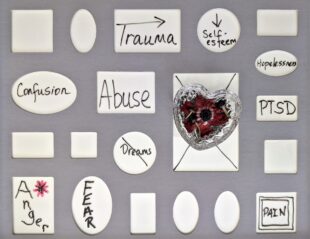4 Ways to Find Relief from Trauma and PTSD
Karyn George
The effects of trauma and PTSD on a person’s life are wide-reaching both in time span and relational bandwidth. If you find yourself wondering about whether or not you suffer from trauma and PTSD, this article may help!
We’ll discuss the definition of both trauma and PTSD, some symptoms to watch for, and four types of treatment that can help a person who has been through trauma and/or PTSD. Here are some possible signs that you or someone you love is struggling.
What is trauma?
In its most basic form, trauma is the response that a person has to a stressful event that involves a threat to their life, a loss of life, or an extreme injury. While anyone can experience psychosocial stressors, true trauma, as defined by the DSM-5, involves “actual or threatened death, serious injury or sexual violence.”
 While trauma is limited to the previous definition, psychosocial stressors are traumatic and damaging and can impact all spheres of a person’s life. Healing from traumatic events or trauma is possible.
While trauma is limited to the previous definition, psychosocial stressors are traumatic and damaging and can impact all spheres of a person’s life. Healing from traumatic events or trauma is possible.
Some traumatic events occur in a person’s childhood, and others are experienced as adults. Many think of trauma only as acute trauma, however, trauma can be broken down into various types: acute, chronic, complex, and secondary.
Acute trauma is when a person experiences a sudden event that causes stress. This is what many commonly consider trauma, such as the death of a parent, a car accident, an assault, or a one-time event that marks the person’s ability to function in some way. While acute trauma is experienced after a one-time event, the stress from it usually lasts much longer.
Chronic trauma is when a person experiences struggle over and over again. This includes repeated violation of a person’s body, bullying that goes beyond a one-time occurrence, domestic abuse of any kind, or being subject to traumatic experiences multiple times.
Complex trauma is something that many experience in their early childhood development, sadly often due to the neglect of a caregiver. It involves any chronic trauma that is ongoing and threatens a person’s sense of identity and safety over time.
It can cause severe developmental delays in children. Extreme neglect, insecure food and housing or homelessness, and/or ongoing physical or sexual abuse would be examples of complex trauma.
Other types of complex trauma can include growing up in a war zone, being faced with multiple deaths, situations of torture such as in war, ongoing emotional abuse, human trafficking, or the feeling of being trapped in a long-term system of abuse.
Secondary trauma is what a person experiences when he or she is exposed to others’ suffering repeatedly. It can occur in adults who are caregivers, medical personnel, soldiers who watch fellow soldiers suffer or die, or a child who has a parent with substance abuse issues, a mental illness, or who has witnessed abuse in the home.
What is PTSD?
PTSD stands for post-traumatic stress disorder, and it can occur in any person’s life – young or old. It is a disorder that develops after a traumatic event of some sort, whether that event was experienced by the individual with the disorder or witnessed by that individual.

Typically, the symptoms that PTSD triggers last long after the traumatic event has occurred. PTSD has a fascinating history. It has gone through a myriad of name changes as we learned more about it including Traumatic Neurosis, De Costa’s Heart, and Shell Shock.
It wasn’t formally recognized until 1980 when it made its way into the DSM III as Post-Traumatic Stress Disorder. Although it was once thought to only impact soldiers, veterans, or those who serve in trauma-related professions such as emergency health care or the police force, trauma and PTSD affect many individuals and families.
What are the Symptoms of Trauma and PTSD?
Some symptoms of trauma and PTSD include:
Repeated, intrusive thoughts and/or memories that cause the individual to experience physical and emotional stress.
These can be thoughts or memories while a person is awake or while they are sleeping, experienced as nightmares involuntarily. The term “flashback” is often applied to this kind of intrusive thought when it’s attached to a memory of the traumatic event.
Changes in how a person thinks or feels over time.
These changes can relate to not enjoying activities that the individual once enjoyed. They can also be an avoidance of attachment by separating oneself from family members or friends, keeping them at an emotionally safe distance. This symptom of changes can also impact a person’s mood, causing them to believe inerrant things about themselves, others, or the traumatic event. When a person loses memory surrounding an event, it falls under these types of cognitive changes.
Avoidance of anything or anyone that would remind them of the traumatic event.
War veterans sometimes avoid their friendships with fellow servicemen because of having experienced traumatic events with those friends. Other types of avoidance might be fear of or resistance to talking about the traumatic event because the event brings up too much negative emotion or thought.
Change in a person’s excitability or anger levels.
When someone has PTSD, it often means their emotions can be triggered involuntarily, especially if the PTSD has not been treated. These outbursts may be sudden fits of anger or irritability, unexplained tendencies toward compulsion that is risky or dangerous, and sleep issues.
4 treatment options for trauma and PTSD.
 There are four well-researched, evidenced treatment options that can help someone who has PTSD. Unfortunately, without treatment, trauma and PTSD do not just go away. The symptoms may subside or ebb and flow at times, but without treatment, the effects of trauma and PTSD on a person’s life are monumental. They influence the individual and his relationships.
There are four well-researched, evidenced treatment options that can help someone who has PTSD. Unfortunately, without treatment, trauma and PTSD do not just go away. The symptoms may subside or ebb and flow at times, but without treatment, the effects of trauma and PTSD on a person’s life are monumental. They influence the individual and his relationships.
Here are four treatments that can help:
The use of story or narrative.
Some evidence suggests that someone who has experienced trauma and PTSD gains healing whenever he tells the story of that traumatic event. One caution is that the use of story must be within the care of a trained, trauma-informed psychologist or it can be dangerous and re-traumatizing to the person who experienced trauma and PTSD.
However, if the story elements are directed by a trained professional through a form of talk therapy, it can be effective.
Eye Movement Desensitization and Reprocessing (EMDR) therapy.
Eye Movement Desensitization and Reprocessing for PTSD (also known as EMDR therapy) can be especially helpful for individuals for whom talk therapy isn’t effective. Through a series of eye movements and answering questions about the traumatic experience, an individual’s memory can change over time making the traumatic event less triggering and painful.
It is important to underscore how vital it is to ensure that any treatment for trauma and PTSD be administered by a trauma-informed psychologist who is familiar with the disorder and has an evidence-backed history of beneficial treatment options. Our offices are home to several of these therapists. Contacting us will be a good first step to finding the right professional to help you or your loved one with PTSD.
Cognitive Behavioral Therapy (CBT).
Cognitive Behavioral Therapy (CBT) is widely respected among professionals who treat a variety of psychological disorders. It involves challenging distorted thinking patterns that have been caused by trauma.
Over time, working with a CBT-trained therapist can give individuals greater confidence in their abilities and help them to reframe problems in light of reality. It can also equip them with the necessary problem-solving skills to move forward in life so that they are not continually held back by the trauma they experienced.
Prolonged Exposure Therapy.
Prolonged exposure therapy is a gradual approach to whatever caused the trauma. In people with PTSD, this type of therapy typically lasts for three months and begins with an evaluation and treatment plan.
After that, the therapist will help the person to re-tell in the present tense the traumatic event or events. With help from the trauma-trained professional counselor, the person who suffers from PTSD talks through how he or she felt while describing the events in the present tense.
 Next, this type of therapy involves listening to the present-tense recording and providing homework assignments related to it.
Next, this type of therapy involves listening to the present-tense recording and providing homework assignments related to it.
Patients learn to work with the counselor to identify which situations they avoided due to the traumatic event and, slowly, they introduce ways to cope and reimagine these situations. Over time, patients can recognize the traumatic event and not avoid it or people and experiences that may remind them of it.
If you or someone you love is experiencing signs of PTSD or you are interested in finding a trauma-informed counselor, contact our offices and we will guide you step by step to the healing that’s available – and possible – for you.
“Trauma”, Courtesy of Susan Wilkinson, Unsplash.com, CC0 License; “Watching the Water”, Courtesy of Pierre Bamin, Unsplash.com, CC0 License; “How Are You Really?”, Courtesy of Finn, Unsplash.com, CC0 License; “Overwhelmed”, Courtesy of Nik Shuliahin, Unsplash.com, CC0 License






